The 2022 Beijing Winter Games will likely be remembered for being yet another "COVID Olympics."
Similar to the Summer Games only six months ago, athletes, staff and journalists were required to stay in a closed "bubble," cut off from the local population over fears of spreading the disease. Athletes performed before an audience on television with few fans in attendance.
Still, there was much more to the Winter Games than the cloud of the ongoing pandemic.
NPR's team in Beijing put together moments and storylines that stuck out — including those that showed immense inner strength, athleticism and grace.
Skier Mikaela Shiffrin faces failure with grace
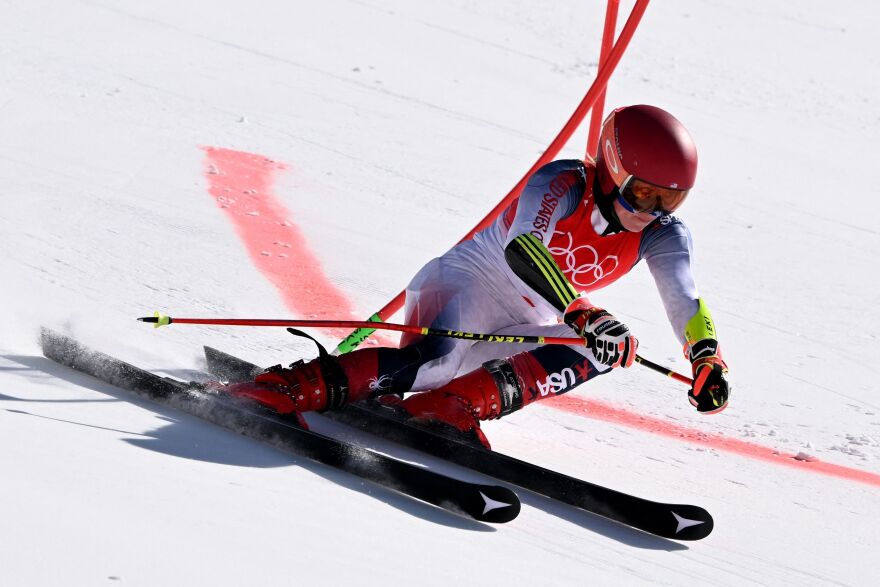
It wasn't a gold-medal winning moment by U.S. Alpine star Mikaela Shiffrin that put her on the top of the list. Rather, it's the way the Olympian failed — and responded to her unusual struggles on the slopes.
Shiffrin is a bona fide star — despite what internet trolls have been saying about the 26-year-old. She has won more World Cup slalom races than anyone in history, woman or man. She came into these Games already having won three Olympic medals, including two gold.
Asked about the pressure of coming into the Games as one of those few athletes expected to win medals, Shiffrin said she felt pressure but no more than she had experienced before.
"That's the whole shebang in sport: You can have preparation, confidence ... and sometimes it works and sometimes it doesn't," she said. "And I literally have no idea why we keep coming back and doing it."
In the mountains northwest of Beijing, she didn't finish three of her five individual races after either falling or skiing out of the course after a matter of seconds.
She managed to face those difficulties thoughtfully, honestly and with a sense of humor.
"I don't know if anybody's failed that hard with so many opportunities — maybe in the history of the Olympics. But I will take it," she said joking.
One of the Games' lasting images may be her after her second race: Sitting by the safety netting off to the side, with her head down.
She leaves China with no hardware, but Shiffrin can take solace in her handling of failure. And how, if people were paying attention, she taught them something about failing with grace and honesty.
Nathan Chen stuns in men's figure skating
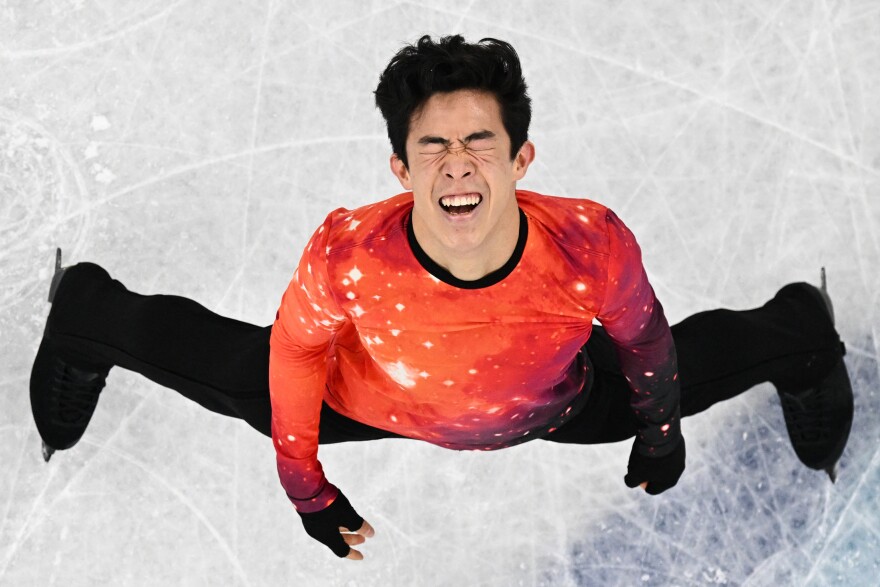
These Games were billed as U.S. figure skater Nathan Chen's chance for redemption after a disastrous performance during the 2018 Pyeongchang Games.
In the face of immense pressure heading into Beijing, Chen managed to deliver. His stunning short program performance netted him a season-high, world record score of 113.97. It set the bar high for his final run on the ice later that week.
He was the last skater of the day among a slew of talented skaters — each better than the last. It seemed each man executed routines that were energetic and just pure fun. Some performances even had even the audience clapping their hands to the beat of the music.
But when Chen took to the ice everyone sat at attention.
Dancing to a medley of "Rocket Man" and "Benny and the Jets" by Elton John, Chen showed why he is the best. He took to the ice exuding joy and looking confident as ever.
He put those Pyeongchang demons behind him — and then some.
Pairs figure skaters from China take gold
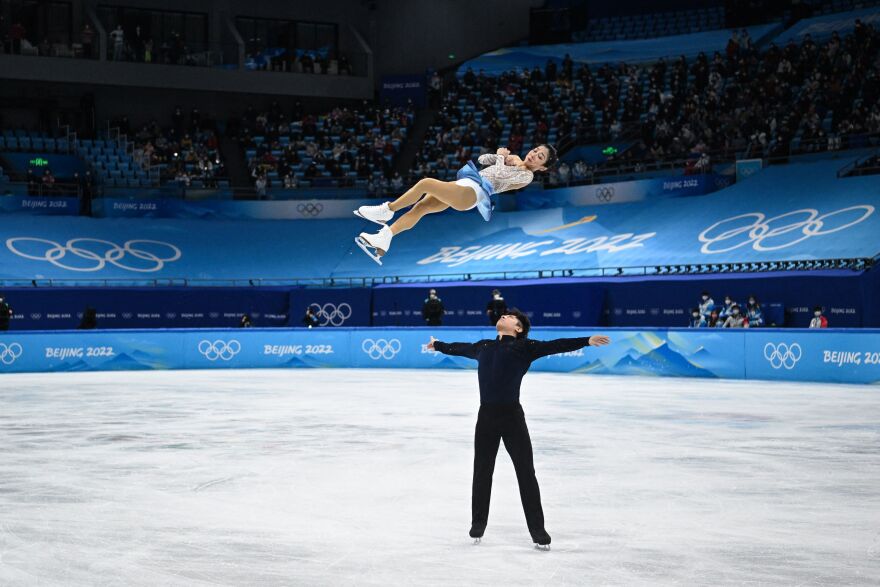
The victory in pairs figure skating by Sui Wenjing and Han Cong of China came at the end of the Games — a crowning moment for the host country. The 2018 Olympic pairs silver medalists skated last, knowing what they had to do and shouldering the pressure of an entire country hoping and cheering for them.
Despite a few wobbles on jumps by Sui, the duo pulled together in the rest of their program and won the gold. It was comments Sui made that resonated with sports-watchers and athletes.
"We feel like when we show our best selves to the world, the world belongs to us," Sui said after the pair's dazzling performance in the short program. "Only during these several minutes, perhaps billions of people around the world are looking at us. That is the most honorable moment in our life."
This made sense after watching so many thrilled athletes at these Games perform well, although "fail" by the outside world's standards because they didn't win medals.
But talk to enough Olympians and most understand they won't win a medal. It's an old sports cliché, but athletes consistently say they just want to do their best. Sui's words get to the heart of why. These athletes — many in seemingly strange niche sports — train for years, out of the limelight. Then comes the "several minutes" when the world watches and cares. To do well or to "show our best selves," as Sui said, is a memorable triumph.
Eileen Gu is a breakout star
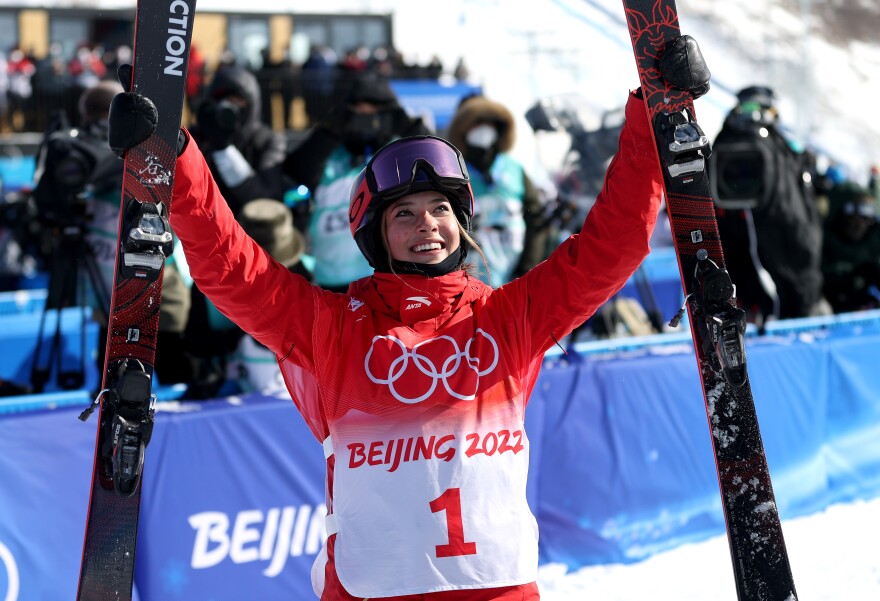
The 18-year-old Gu, affectionately called the "Snow Princess" by Chinese fans, had a whirlwind experience in Beijing. She won gold in the freeski halfpipe and became the first athlete to reach the podium in three different freestyle skiing events. She also won gold in big air and the silver medal in slopestyle.
Gu also became the poster child of the difficulties navigating two cultures.
The San Francisco-born athlete, who was born to a Chinese mother and American father, chose to represent China for the Olympics. Gu spoke frequently about spending summers in China to visit family and friends and about being fluent in both the culture and Mandarin.
"Both experiences in the two countries made me who I am. I am American when I am in America, and I am Chinese when I am in China," she said.
Questions over whether she gave up her American citizenship in order to do this arose during the Games, but Gu was mum about whether that was the case.
Critics in the U.S. accused Gu of being a "traitor" to the U.S. or said she needed to "pick a side. "
With maturity and a clear sense of self, she responded: "It doesn't really matter if other people are happy or not because I feel as though I am doing my best, I'm enjoying the entire process, and I'm using my voice to create as much positive change as I can for the voices who will listen to me in an area that is personal and relevant to myself."
China has made no qualms about embracing their "princess." Gu's appearance on Chinese TV and for ads for sports apparel and other products was constant, and it's likely we will continue to see the breakout star's face for a long time.
Gu said she plans to use her platform for good.
"I especially want to use the sport as a force to connect people in the two countries instead of dividing them," she told the media in Beijing.
Erin Jackson takes gold after almost missing the Games
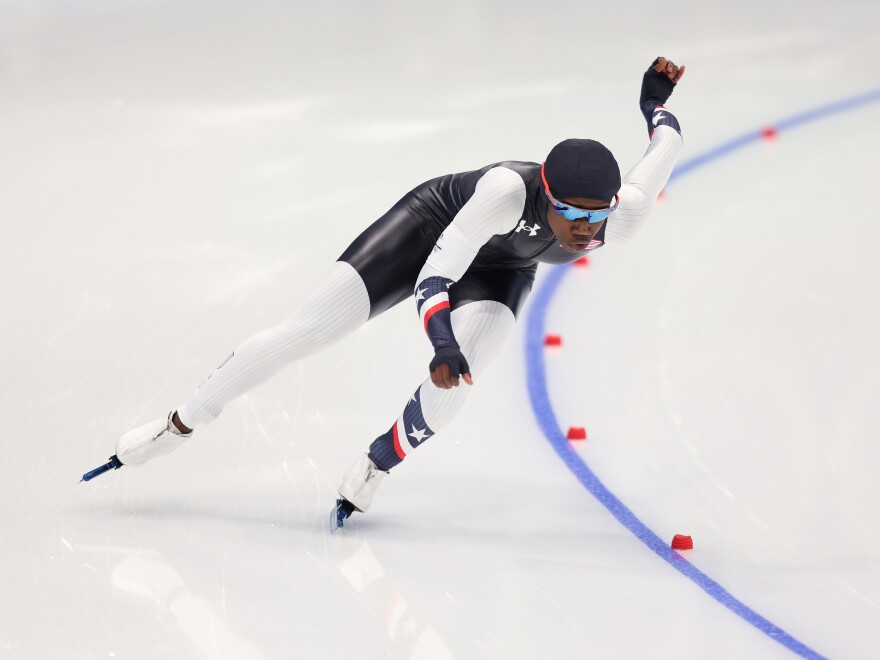
American Erin Jackson won gold in the women's 500-meter speedskating competition — becoming the first Black woman to medal in speedskating at a Winter Olympics.
The last time an American woman took the top spot in this event was in 1994.
The whole feat was made even more incredible given that Jackson almost missed out on the chance to compete in Beijing entirely.
Jackson was top-ranked in the 500-meter speedskating event leading up to the qualifying trials. But a shocking stumble in her race at the U.S. trials pushed her to third place, thereby disqualifying her from a spot in the Winter Games.
That's when her teammate and friend Brittany Bowe gave up her spot in the 500-meter race so Jackson could compete in Beijing.
"This medal means so much," Jackson said after she won gold. "It has been a tough couple of years and a tough beginning for this year. For this to come around like this, I am so happy."
"Don't count the old girl out"

Athletes are usually considered in the prime of their careers in their 20s. But that's not always the case, as shown by U.S. snowboarder Lindsey Jacobellis.
After a 16-year medal drought (she last won silver at the 2006 Torino Games), the 36-year-old dominated in Beijing. She overpowered a much younger field of racers during the women's snowboard cross and won her first career gold.
She went on to compete at the first-ever mixed team snowboard cross event with 40-year-old teammate Nick Baumgartner — again winning gold.
"Don't count the old girl out," Jacobellis joked at the time. "As I've gotten older, I've learned to forgive myself of the uncontrollable variables, and that's just taking maturity and time. And that helps you heal and move on and apply that skill that you learned in your next race."
Shaun White lays down a final run to retire
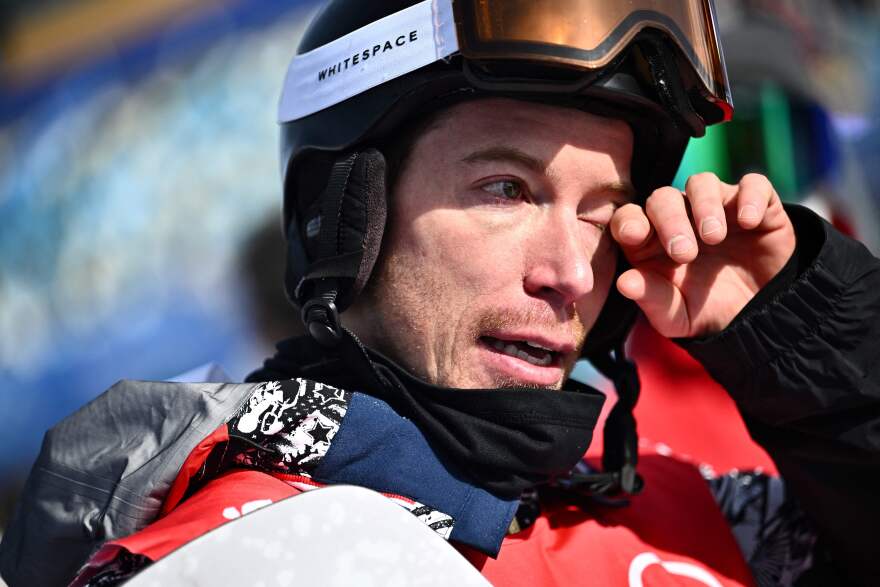
Shaun White finished fourth on the halfpipe in Beijing — just missing a medal at his last competition before retiring.
The 35-year-old said he was proud of his effort, despite falling short in the push to win a fourth career gold medal. He was visibly emotional as he was embraced by his competitors.
"A lot of emotions are hitting me right now — the cheering from the crowd, some kind words from my fellow competitors at the bottom. I'm so happy," he said. "Snowboarding, thank you. It's been the love of my life."
He debuted at the Torino Olympics in 2006. The Beijing Games were his fifth Winter Games. White maintains his place in the record books as the only snowboarder to win three Olympic gold medals.
An Olympics without politics or protest, with one notable exception

Before these Games, there was much talk about the politics of the host country, and the government's treatment of marginalized groups and pro-democracy activists: Tibetans, Hong Kongers, the Uyghurs of Xinjiang province.
In an era of athlete protest, would Olympians take the torch from human rights advocates and speak out against documented abuses by the Chinese government?
No.
It was startling that an Olympics in a host country criticized by many around the world, and diplomatically boycotted by the U.S. and others, would be so devoid of activism.
The International Olympic Committee could take credit with its oft-repeated stance of political neutrality — saying the Games are all about bringing the world together.
In reality, athletes undoubtedly felt the chill created by Chinese organizers who threatened to punish anyone who criticized. National Olympic committees warned their athletes about the risk of speaking out.
Other than a Ukrainian skeleton racer holding up a sign reading "No War in Ukraine," the Olympians were quiet.
The only notable breach of the "no politics" rule came when Yan Jiarong, a Beijing Olympics spokesperson, went a bit off the rails at the final joint briefing of the IOC and Beijing organizers.
"What I want to say is that there is only one China in the world. Taiwan is an indivisible part of China," she said in response to a question about whether Taiwan's Olympic team would appear at the closing ceremony.
She then accused a journalist of asking questions "based on lies" when asked about the forced labor and human rights violations imposed on Uyghurs.
IOC President Thomas Bach said afterward that the two committees had a meeting and agreed to refocus on the principle of political neutrality "as required by the Olympic Charter."
Kamila Valieva falters while another Russian doping scandal clouds the Olympics
The headline-stealing Russian doping scandal that threw women's figure skating in disarray may become the lasting story from these Games.
Fifteen-year-old Russian figure skater Kamila Valieva was a favorite to win, but controversy followed after it emerged that she had tested positive for a banned drug in December. She ended up finishing fourth in women's singles.
The resolution of her case is still far from over. Investigators with the World Anti-Doping Agency are looking into it and may examine the role of her controversial coach.
In addition, before the positive test was made public, she had already helped the Russian Olympic Committee take gold in the team event. U.S. figure skaters who won the silver medal in the team event still have to wait to receive their medals — despite putting in a last-ditch effort to appeal the decision to delay the medal ceremony.
It's also unclear whether the IOC will take any measures against the Russian Olympic Committee for yet another doping scandal involving one of their athletes.
Questions also remain over whether the IOC should allow such young athletes to compete on the world stage. Valieva crumbled in her last performance after facing days of pressure and scrutiny.
IOC head Bach said he was "disturbed" by the response of Valieva's coach to her performance, but Bach offered little concrete plans on what his organization will do to change things going forward.
Doping expert April Henning told NPR that the anti-doping system as it is now "is a mess." She said Valieva "was failed at all levels in terms of duty of care."
Copyright 2023 NPR. To see more, visit https://www.npr.org.






